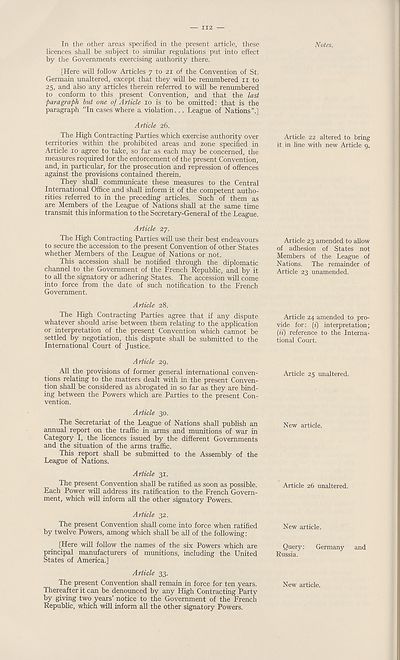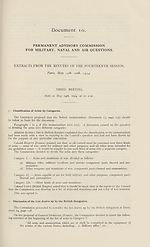Armament > Conference for the control of the international trade in arms, munitions and implements of war
(114)
Download files
Complete book:
Individual page:
Thumbnail gallery: Grid view | List view

112
In the other areas specified in the present article, these
licences shall be subject to similar regulations put into effect
by the Governments exercising authority there.
[Here will follow Articles 7 to 21 of the Convention of St.
Germain unaltered, except that they will be renumbered 11 to
25, and also any articles therein referred to will be renumbered
to conform to this present Convention, and that the last
paragraph but one of Article 10 is to be omitted: that is the
paragraph "In cases where a violation... League of Nations”.]
Article 26.
The High Contracting Parties which exercise authority over
territories within the prohibited areas and zone specified in
Article 10 agree to take, so far as each may be concerned, the
measures required for the enforcement of the present Convention,
and, in particular, for the prosecution and repression of offences
against the provisions contained therein.
They shall communicate these measures to the Central
International Office and shall inform it of the competent autho¬
rities referred to in the preceding articles. Such of them as
are Members of the League of Nations shall at the same time
transmit this information to the Secretary-General of the League.
Article 27.
The High Contracting Parties will use their best endeavours
to secure the accession to the present Convention of other States
whether Members of the League of Nations or not.
This accession shall be notified through the diplomatic
channel to the Government of the French Republic, and by it
to all the signatory or adhering States. The accession will come
into force from the date of such notification to the French
Government.
Article 28.
The High Contracting Parties agree that if any dispute
whatever should arise between them relating to the application
or interpretation of the present Convention which cannot be
settled by negotiation, this dispute shall be submitted to the
International Court of Justice.
Article 29.
All the provisions of former general international conven¬
tions relating to the matters dealt with in the present Conven¬
tion shall be considered as abrogated in so far as they are bind¬
ing between the Powers which are Parties to the present Con¬
vention.
Article 30.
The Secretariat of the League of Nations shall publish an
annual report on the traffic in arms and munitions of war in
Category I, the licences issued by the different Governments
and the situation of the arms traffic.
This report shall be submitted to the Assembly of the
League of Nations.
Article 31.
The present Convention shall be ratified as soon as possible.
Each Power will address its ratification to the French Govern¬
ment, which will inform all the other signatory Powers.
Article 32.
The present Convention shall come into force when ratified
by twelve Powers, among which shall be all of the following:
[Here will follow the names of the six Powers which are
principal manufacturers of munitions, including the United
States of America.]
Article 33.
The present Convention shall remain in force for ten years.
Thereafter it can be denounced by any High Contracting Party
by giving two years' notice to the Government of the French
Republic, which will inform all the other signatory Powers.
Notes.
Article 22 altered to bring
it in line with new Article 9.
Article 23 amended to allow
of adhesion of States not
Members of the League of
Nations. The remainder of
Article 23 unamended.
Article 24 amended to pro¬
vide for: (i) interpretation;
(ii) reference to the Interna¬
tional Court.
Article 25 unaltered.
New article.
Article 26 unaltered.
New article.
Query: Germany and
Russia.
New article.
In the other areas specified in the present article, these
licences shall be subject to similar regulations put into effect
by the Governments exercising authority there.
[Here will follow Articles 7 to 21 of the Convention of St.
Germain unaltered, except that they will be renumbered 11 to
25, and also any articles therein referred to will be renumbered
to conform to this present Convention, and that the last
paragraph but one of Article 10 is to be omitted: that is the
paragraph "In cases where a violation... League of Nations”.]
Article 26.
The High Contracting Parties which exercise authority over
territories within the prohibited areas and zone specified in
Article 10 agree to take, so far as each may be concerned, the
measures required for the enforcement of the present Convention,
and, in particular, for the prosecution and repression of offences
against the provisions contained therein.
They shall communicate these measures to the Central
International Office and shall inform it of the competent autho¬
rities referred to in the preceding articles. Such of them as
are Members of the League of Nations shall at the same time
transmit this information to the Secretary-General of the League.
Article 27.
The High Contracting Parties will use their best endeavours
to secure the accession to the present Convention of other States
whether Members of the League of Nations or not.
This accession shall be notified through the diplomatic
channel to the Government of the French Republic, and by it
to all the signatory or adhering States. The accession will come
into force from the date of such notification to the French
Government.
Article 28.
The High Contracting Parties agree that if any dispute
whatever should arise between them relating to the application
or interpretation of the present Convention which cannot be
settled by negotiation, this dispute shall be submitted to the
International Court of Justice.
Article 29.
All the provisions of former general international conven¬
tions relating to the matters dealt with in the present Conven¬
tion shall be considered as abrogated in so far as they are bind¬
ing between the Powers which are Parties to the present Con¬
vention.
Article 30.
The Secretariat of the League of Nations shall publish an
annual report on the traffic in arms and munitions of war in
Category I, the licences issued by the different Governments
and the situation of the arms traffic.
This report shall be submitted to the Assembly of the
League of Nations.
Article 31.
The present Convention shall be ratified as soon as possible.
Each Power will address its ratification to the French Govern¬
ment, which will inform all the other signatory Powers.
Article 32.
The present Convention shall come into force when ratified
by twelve Powers, among which shall be all of the following:
[Here will follow the names of the six Powers which are
principal manufacturers of munitions, including the United
States of America.]
Article 33.
The present Convention shall remain in force for ten years.
Thereafter it can be denounced by any High Contracting Party
by giving two years' notice to the Government of the French
Republic, which will inform all the other signatory Powers.
Notes.
Article 22 altered to bring
it in line with new Article 9.
Article 23 amended to allow
of adhesion of States not
Members of the League of
Nations. The remainder of
Article 23 unamended.
Article 24 amended to pro¬
vide for: (i) interpretation;
(ii) reference to the Interna¬
tional Court.
Article 25 unaltered.
New article.
Article 26 unaltered.
New article.
Query: Germany and
Russia.
New article.
Set display mode to:
![]() Universal Viewer |
Universal Viewer | ![]() Mirador |
Large image | Transcription
Mirador |
Large image | Transcription
Images and transcriptions on this page, including medium image downloads, may be used under the Creative Commons Attribution 4.0 International Licence unless otherwise stated. ![]()
| League of Nations > Armament > Conference for the control of the international trade in arms, munitions and implements of war > (114) |
|---|
| Permanent URL | https://digital.nls.uk/195383245 |
|---|
| Shelfmark | LN.IX |
|---|
| Description | Over 1,200 documents from the non-political organs of the League of Nations that dealt with health, disarmament, economic and financial matters for the duration of the League (1919-1945). Also online are statistical bulletins, essential facts, and an overview of the League by the first Secretary General, Sir Eric Drummond. These items are part of the Official Publications collection at the National Library of Scotland. |
|---|---|
| Additional NLS resources: |
|

